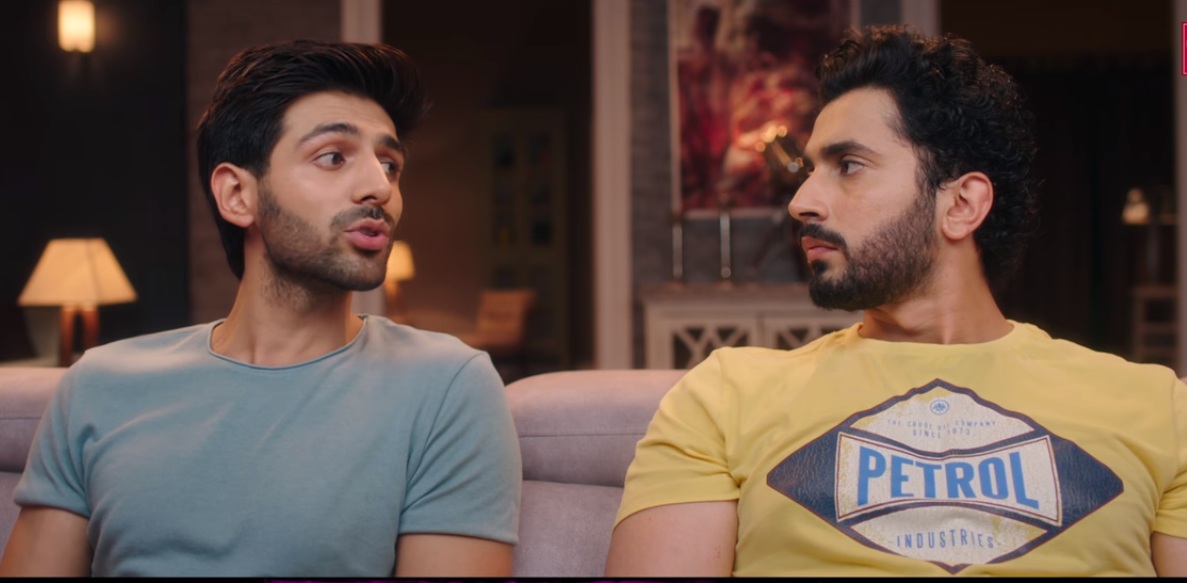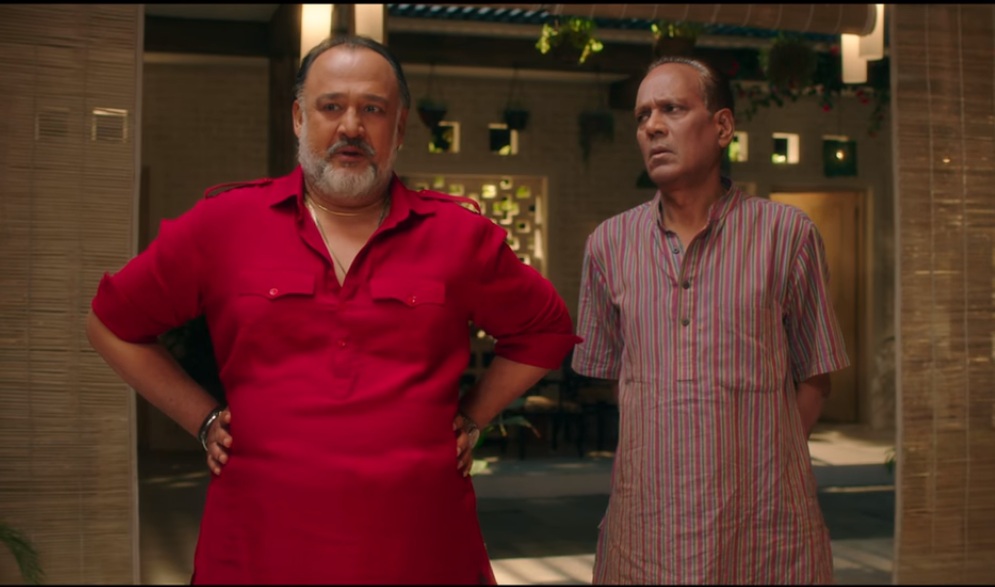Spolier Alert: This post contains spoilers about the movie. So if you haven’t watched the movie yet, read it at your own discretion
As I watched Sonu Ke Titu Ki Sweety in the multiplex, I kept telling myself, “This is a gay romance movie”. Every passing scene made my assumption stronger, and I later found out that may other gay friends too agreed that it was indeed a gay love story, masked under the cloak of a hetero-marriage. Yet, it is surprising that none of the reviews online have touched upon it, or even made a mention about it. Most reviewers seem to have been hung about the misogyny of the director’s previous movies (Pyaar ka Punchanama), and have called Sonu Ke Titu Ki Sweety too as a misogynist movie
The first half of the movie goes on to establish the “very close” ties of the lead male actors- Sonu (played by Kartik Aaryan) and Titu (played by Sunny Nijar). And unless you are wearing very thick heterosexual glasses to colour your view, you realise that Sonu is in love with Titu, and so is Titu (though he doesn’t realise it until the end). The movie begins with Titu making a call to Sonu and asking him to come to him urgently. A heart broken Titu is shown crying because he has had a fight with his girl friend as he opened Tinder on her mobile. Sonu starts rebuking him for being in a manipulative relationship, and asks him to break up. When Titu refuses, he asks him to choose between her and him. Titu obvioulsy chooses his childhood friend over a girl, and that sets the tone of the movie firmly – of a man deeply in love with his childhood friend who won’t let him be with a girl for long.

Sonu and Titu
After this episode, Titu decides it is time for him to get married to a girl and settle down. Sonu is left shell-shocked at his decision, and tries his best to convince him out of it. So when Titu says he wants someone in his life who would take care of him, love him, live with him throughout his life, Sonu promptly asks, “Main nahi hoon? Main poora nahi par raha tujhe? Main pyaar nahi deta tujhe. Mera pyaar pura nahi parta tujhe?” (Ain’t I there, am I not enough for you? Am I not loving you? I my love not enough for you?). He then goes on to list a number of things he has done for Titu to take care of him which no girl would have done, even cancelling his own dates to look after him. He then says there’s only one thing he hasn’t given to him which he will get from his wife (i.e. sex) and that he is ready to give him that as well, if only he asks! All the while Titu keeps telling he isn’t marrying for sex, while Sonu keeps asking him then why would he decide to marry a girl.
Cut to the next scene where Titu and his family (along with Sonu) go to meet the girl the family has chosen. Sonu keeps observing how Titu is getting charmed with the girl, with a jealous expression of a lover losing his love to another person. When the families ask Titu and the girl Sweety to go out and talk to each other, Sonu gets up too, and Titu’s mother holds his hand and jokes to her would be daughter-in-laws family, “If he could, he would even accompany Titu to his honeymoon.” Titu too cannot seem to live without Sonu, and during the brief time he spends with Sweety, keeps talking about Sonu and their life, and how no one could even imagine the two of them living separate from each other. In the meantime, Sonu is shown getting anxious and Titu’s mother tells him, “Kidnap thori na kar legi tere Titu ko,” as others laugh yet again. But the decision to marry the girl is not just of Titu alone, he defers it to Sonu. Sonu remains tensed because he can’t seem to find enough reasons to break the pending engagement, and reluctantly “allows” Titu to marry her. As the “Roka” is done, and ‘Subah Subah’ song plays, Sonu is shown looking at Titu and Sweety with an expression of a dejected lover.

Sonu looking at newly engaged Titu and Sweety dejectedly (Screengrab from the song Subah Subah)
But Sweety’s interference in their life has just started. She brings in a male house help for the two. And when a surprised Titu asks Sonu, “Babu se Mila (Have you met Babu),” he asks back, “Kiske liye? (For whom?)”. Titu replies, “Humare liye (For us).” Sonu instantly shoots back, “Mujhe nahi chahiye (But I don’t need one).” The conversation hinting as if Babu is there to serve the sexual needs of the two as well. Irritated by the continuous presence of the house help (picked by Sweety), Sonu devises a plan to get rid of him. But the undertones of his actions are sexual and the house help is shown getting nervous and uncomfortable around Sonu. One even begins thinking that Sonu plans to make sexual advances towards Babu and scare him enough to quit.
The first half of the movie thus firmly establishes the “strong and extremely close” relationship of Sonu and Titu, and how unwelcome Sweety is in their life.
Much of the second half goes in Sonu trying his best to break the engagement. He would do anything a jilted lover would do to win back his love. However, in this heterosexual world, the girl always seem to have the upper hand. He does everything possible to break the two up- from digging past relationships of Sweety, to taking Titu to Amsterdam for a bachelors party and trying to set him up there with his ex-girl friend (the one he had forced Titu to break up with). But Sweety exposes all his attempts, and despite all this, Titu doesn’t even attempt to break free from Sonu. With just a day left for the marriage, the haldi ceremony is being held where Sonu takes part reluctantly, his expression being that of a lover who has accepted that he is soon going to lose his lover forever, yet is forced to partake in the celebration of the death of his relationship, The song “Tera Yaar Hoon Main” plays in the background. Interestingly, “Yaar” in Hindi is also a term used for a lover.

A dejected Sonu (Kartik Aaryan) taking part in the Haldi ceremony of Titu (Screengrab from Tera Yaar Hoon video song)
In the final conversation between Sonu and Sweety, Sonu tells Sweety that he won’t let this marriage happen, even if he has to die to stop the marriage. Sweety retorts, “Dost aur ladki mein hamesha ladki jeetti hai.” (Between friendship and a girl, it is the girl that wins). She of course doesn’t realise that Sonu and Titu are not merely “friends”. Cut short to the final scene, the baraat arrives, and as the two are about to exchange garlands, Sonu plays his Trump Card and asks Titu to choose between Sweety and him, and leaves the mandap crying. This makes Titu realise his own love for Sonu, and he tells Sweety that if it boils down to choosing between Sonu and her, he will always choose Sonu. He then walks away from the mandap, the scene reminiscent of the climax of many Bollywood movies, where the hero/heroine decides to break their arranged marriage to be with their true love. In the next scene, Sweety’s mother is shown taunting Titu’s mother that his son is a “bacchalan” (characterless), an apparent reference to Titu’s relationship with Sonu.
The movie ends with an interesting conversation between Sonu and Titu, showing Titu’s acceptance of their relationship. Sonu remarks, “Kasam se upar wale ne acchi ladkiyan banani hi band kar di hai” (God had stopped making good girls), to which Titu replies (keeping his hand on Sonu’s thighs), “Koi na, main hoon na.” (Don’t worry, I am there). Drifting the conversation towards sex, Sonu retorts, “Tun hai matlab, main kya pagal hun puri zindagi tere sath maraunga?” (What do you mean by I am there, am I mad that I will keep fucking around with you for my whole life?). In a role reversal of sorts, Titu, while calling Sonu as his darling (and keeping his hand again on his thighs), now says he knows that Sonu has “needs” but he doesn’t need to marry for sex.
While Sonu and Titu’s love story is the main queer plot of the movie, there is another queer relationship depicted in the movie, that of the grandfather Ghasite (played by Alok Nath) and Lalu Kaka (played by Virendra Saxena).
Like Sonu and Titu, the two are shown to share a “special bond”. We are told that Lalu Kaka was a cleaner at the sweet shop of Alok Nath. Alok Nath’s wife starts tying raakhi to Lalu Kaka, and he becomes a part of their family, and starts living with them. Ghasite and Lalu Kaka are referred to as Batman and Robin by Titu (Batman and Robin are often rumoured to be in a gay relationship). Ghasite, who hasn’t yet written his will, has promised 7% to Lalu Kaka already. The two are almost inseparable, and are shown throughout the movie drinking and smoking secretly in the balcony of Alok Nath’s bedroom, which seems to be the only place where this relationship blossoms, and only Sonu has access to it. They are the only ones who understand Sonu’s predicament, and Sonu too turns to them and shares his problems. They seem to accept the relationship of Sonu and Titu, and even place a bet of Rs 100 on who will Titu choose between Sonu and Sweety. Lalu Kaka would go to any length to protect Ghasite, Ghasite too is so possesive about Lalu that even when the two are fighting, and Sonu sits on the chair that Lalu usually sits on, he shouts at Sonu for having occupied a place reserved exclusively for Lalu.

Ghasite (Alok Nath) and Lalu Kaka’s (Virendra Saxena) relationship in the movie is a queer one as well.
To a queer eye, Sonu Ke Titu Ki Sweety is clearly the story of every gay/bi man who is secretly in love with his best friend, and then sees his friend falling for a woman, all the while trying to show he is happy for the two, while being deeply jealous and dejected from the inside. The movie is probably the most honest depiction of the reality of Indian gay/bi men, who are either too afraid of the society to come out openly, or live in denial about their sexuality and maintain a charade of being straight. Like Sonu, many such men, both under social pressure and to hide their sexuality, often date women and pretend to be a womaniser, even having sex with them so that the world doesn’t doubt them being gay. They can be in a relationship with another man and live together, but only if they both can pass off as straight in the world’s eyes. Like Titu, many gay/bi men in India decide to get married to a girl because they don’t see a future together with another guy. Like Titu, they aren’t marrying a girl for sex, they marry her for lifelong companionship, and a sense of social security, both of which they believe they will never get in a gay relationship devoid of any kind of social approval. In Ghasite and Lalu Kaka, the movie also shows the reality of gay men from an older generation, who are married yet maintain relationship with another man, at times with the full knowledge of their wife. While Ghasite (Alok Nath) is the owner of the company and other properties, his wife is the one he has given the keys to the locker. It is this financial security that forces many such women to not break away from such marriages. They quietly accept the gay lover of their husband in their life.
Despite gay written all over it, it is interesting to see how the director and others associated with the movie have carefully marketed it as a story of two friends and a “chalu” girl. All the promos and trailer of the movie have cleverly only picked up scenes and dialogues that would help create an impression that it is indeed another straight movie. The movie is so much like Karan Johar – you know he is gay, yet he refuses to say it himself and keeps denying it publicly. Like Karan Johar, the movie drops you enough hints, but still wants to pass off as straight. Sonu Ke Titu Ki Sweety has now joined the 100 crore club. But the question is, would the movie be still so successful had it been marketed as a gay rom-com? The answer is No, and there in lies the tragedy.
- Post Amritsar Pride, Punjab’s LGBTQ Community faces Online Trolling, Hate and Threats - July 12, 2023
- Same-Sex Marriage against Indian “Sanskars”, Says UP Govt; High Court Rejects Plea by Lesbian Couple - April 15, 2022
- Karnataka introduces Reservations for Transgender People, 1% Jobs to be Reserved under all Categories - July 21, 2021

